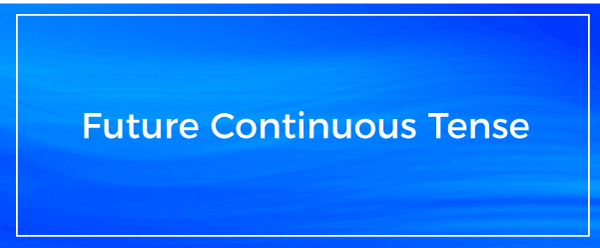Future Continuous Tense

Future continuous tense describes an action that will take place in the future and will continue at a time in the future. To describe such action, 'be' is used after 'shall/will' followed by the 'ing' form of the verb. The structure of the sentence is:
Subject + shall/will + be + V4 (ing form of verb) + other words
Examples:
- I shall be going to market tomorrow.
- We shall be learning Chinese from next month.
- He/she will be playing football from 4 o'clock tomorrow.
- You will be a shining star very soon.
- They will be visiting the museum in the evening.
- John and Ajay will be teaching us how to swim.
- The boys will be practicing for the dance competition.
- My mother will be embroidering this tablecloth for my sister.
- My father will be scolding me for my carelessness.
- The sun will be shining overhead at noon.
Structure of future continuous tense in all forms of sentences
1. Affirmative sentence: In the affirmative sentence of future continuous tense, 'be' is used after 'shall/will' followed by the 'ing' form of the verb. The structure of the sentence is:
Subject + shall/will + be + V4 (ing form of verb) + other objects
Examples:
- I shall be baking the cake.
- We shall be baking the cake.
- He/she will be baking the cake.
- You will be baking the cake.
- They will be baking the cake.
- John will be baking the cake.
- Girls will be baking the cake.
- Sita and Sneha will be doing practice for the cooking competition.
- I will be surely completing my target by the month-end.
- We will be doing hard labor for our coming examination.
2. Negative sentence: In the negative sentence of future continuous tense, 'not' is used after 'shall/will' followed by 'be' and 'ing' form of the verb. The structure of the sentence is:
Subject + shall/will + not + V4+ other words
Examples:
- I shall not be baking the cake.
- We shall not be baking the cake.
- He/she will not be baking the cake.
- You will not be baking the cake.
- They will not be baking the cake.
- John will not be baking the cake.
- Girls will not be baking the cake.
- Sita and Sneha will not be baking the cake.
- I will not be surely completing my target in the month-end.
- We will not be doing hard labor for our coming examination.
3. Interrogative sentence: In the interrogative sentence of future continuous tense, 'shall/will' is used before the subject. The structure of the sentence is:
Shall/will + subject + be + V4 + other words
Examples:
- Shall I be baking the cake?
- Shall we be baking the cake?
- Will he/she be baking the cake?
- Will you be baking the cake?
- Will they be baking the cake?
- Will John be baking the cake?
- Will the girls be baking the cake?
- Will Sneha and Sita be baking the cake?
- Shall I be surely completing my target in the month end?
- Shall we be doing hard labour for the coming examination?
4. Negative interrogative sentences: In the negative interrogative sentence of future continuous tense, 'shall/will is used before the subject, and 'not' is used after the subject followed by 'be' and 'ing' form of the verb. The structure of the sentence is :
Shall/will + subject + not + be + V4 + other words
Examples:
- Shall I not be baking the cake?
- Shall we not be baking the cake?
- Will he/she not be baking the cake?
- Will you not be baking the cake?
- Will they not be baking the cake?
- Will john not be baking the cake?
- Will girls not be baking the cake?
- Will Sneha and Sita not be baking the cake?
- Shall I not be completing my target at the month end?
- Shall we not be doing hard labor for the coming examination?
Uses of future continuous tense
- It is used to describe an action that will occur in the future and will be in progress at a time in the future.
Examples: At this time tomorrow, we will be at our sister's marriage ceremony. I think it will be sunny tomorrow when I go to the office.
- It is used to express a planned action that is expected to happen in the future.
Examples: The examination will be going to start next week. They will be staying here till Monday. My friend will be coming soon.
- To express official plans and arrangements 'be to' is used with the root form of the verb. The structure of such a sentence is:
Subject + be (is/am/are) + to + V1 (I form of verb) + other words
Examples:
The president of America, Joe Biden, is to visit India tomorrow. The conference is to discuss the "new farmer bill." They are to go to London for higher education.
| 
 For Videos Join Our Youtube Channel: Join Now
For Videos Join Our Youtube Channel: Join Now










